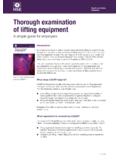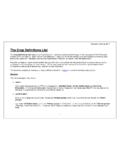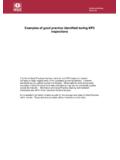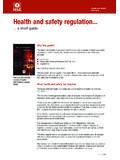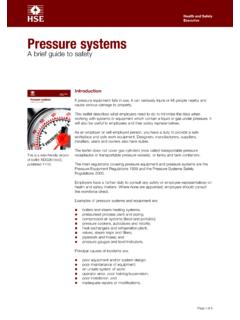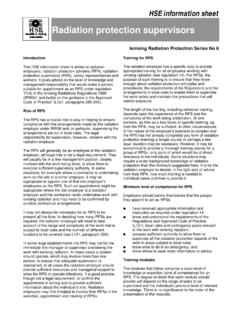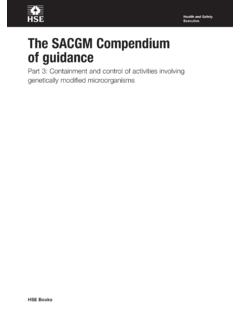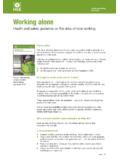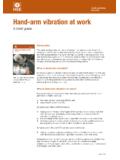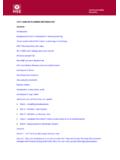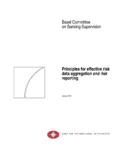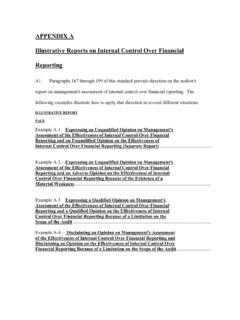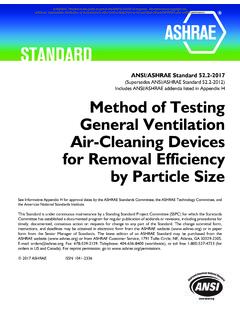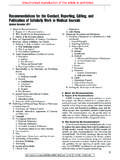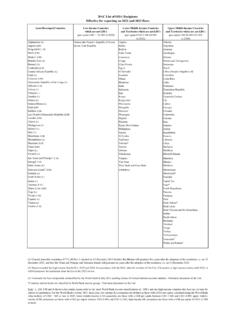Transcription of Incident reporting in schools (accidents, diseases and ...
1 1 of 4 pagesHealth and Safety ExecutiveHealth and Safety ExecutiveEducation Information Sheet No1 (Revision 3)HSE information sheetIncident reporting in schools (accidents, diseases and dangerous occurrences)Guidance for employersIntroductionThis information sheet gives guidance on how the reporting of Injuries, diseases and Dangerous Occurrences Regulations 2013 (RIDDOR) apply to schools . Most incidents that happen in schools or on school trips do not need to be reported. Only in limited circumstances will an Incident need notifying to the Health and Safety Executive (HSE) under RIDDOR. The information sheet gives practical guidance to schools about what they need to report and how to do needs to be reported?
2 RIDDOR requires employers and others in control of premises to report certain accidents, diseases and dangerous occurrences arising out of or in connection with work. The information sheet includes examples of the incidents that sometimes result from schools activities and are reportable under RIDDOR. The sheet contains three sections, which cover: injuries and ill health involving employees (Section 1); injuries involving pupils and other people not at work (Section 2); dangerous occurrences (Section 3).Who should report?The duty to notify and report rests with the responsible person . For incidents involving pupils and school staff, this is normally the main employer at the school.
3 The education pages on HSE s website at provide information about who the employer is in different types of schools . Some school employers may have centrally co-ordinated reporting procedures. In others, reporting may be delegated to the school management team. The health and safety policy should set out the responsibilities and arrangements for reporting in each involving contractors working on school premises are normally reportable by their employers. Contractors could be, eg builders, maintenance staff, cleaners or catering a self-employed contractor is working in school premises and they suffer a specified injury or an over-seven-day injury, the person in control of the premises will be the responsible person.
4 (See HSE s RIDDOR web pages at for more detail on the reporting arrangements for self-employed people.) Who do I report to?For general advice about how to report, see HSE s RIDDOR web pages. You can report all incidents online and there is a telephone service for reporting fatal and specified injuries only. reporting details for out of hours incidents are available from HSE s out of hours web page at incidents on school premises involving members of staff, pupils or visitors, HSE is the enforcing authority and you should submit your reports to them. HSE is also the enforcing authority for nursery provision provided and operated by local authorities. For privately run nursery schools , the local authority is the enforcing authority.
5 What records must I keep?You must keep records of: any reportable death, specified injury, disease or dangerous occurrence that requires reporting under RIDDOR; 2 of 4 pagesIncident reporting in schools (accidents, diseases and dangerous occurrences)Health and Safety Executive all occupational injuries where a worker is away from work or incapacitated for more than three consecutive days. From 6 April 2012 you don t have to report over-three-day injuries, but you must keep a record of them. Employers can record these injuries in their accident must keep records for at least three years after the Incident . Section 1: Injuries and ill health to people at workUnder RIDDOR, the responsible person must report the following work-related accidents, including those caused by physical violence, if an employee is injured, wherever they are working: accidents which result in death or a specified injury must be reported without delay (see Reportable specified injuries ).
6 Accidents which prevent the injured person from continuing their normal work for more than seven days (not counting the day of the accident, but including weekends and other rest days) must be reported within 15 days of the responsible person must also report any case of a work-related disease, specified under RIDDOR, that affects an employee and that a doctor confirms in writing (see Reportable diseases ). You can find detailed guidance about RIDDOR reporting and online reporting procedures at you are in control of premises, you are also required to report any work-related deaths and certain injuries to self-employed people that take place while they are working at the specified injuries These include: fractures, other than to fingers, thumbs and toes; amputations; any injury likely to lead to permanent loss of sight or reduction in sight; any crush injury to the head or torso causing damage to the brain or internal organs; serious burns (including scalding), which: cover more than 10% of the body.
7 Or cause significant damage to the eyes, respiratory system or other vital organs; any scalping requiring hospital treatment; any loss of consciousness caused by head injury or asphyxia; any other injury arising from working in an enclosed space which: leads to hypothermia or heat-induced illness; or requires resuscitation or admittance to hospital for more than 24 violenceSome acts of non-consensual physical violence to a person at work, which result in death, a specified injury or a person being incapacitated for over seven days, are reportable. In the case of an over-seven-day injury, the incapacity must arise from a physical injury, not a psychological reaction to the act of of reportable injuries from violence include an Incident where a teacher sustains a specified injury because a pupil, colleague or member of the public assaults them while on school premises.
8 This is reportable, because it arises out of or in connection with occupational diseases Employers must report occupational diseases when they receive a written diagnosis from a doctor that their employee has a reportable disease linked to occupational exposure. (See for details of the reporting arrangements for self-employed people.)These include: carpal tunnel syndrome; severe cramp of the hand or forearm; occupational dermatitis, eg from work involving strong acids or alkalis, including domestic bleach; hand-arm vibration syndrome; occupational asthma, eg from wood dust and soldering using rosin flux; tendonitis or tenosynovitis of the hand or forearm; any occupational cancer; any disease attributed to an occupational exposure to a biological stress and stress-related illnesses (including post-traumatic stress disorder) are not reportable under RIDDOR.
9 To be reportable, an injury must have resulted from an accident arising out of or in connection with work. In relation to RIDDOR, an accident is a discrete, identifiable, unintended Incident which causes physical injury. Stress-related conditions usually result from a prolonged period of pressure, often from many factors, not just one distinct of 4 pagesIncident reporting in schools (accidents, diseases and dangerous occurrences)Health and Safety ExecutiveSection 2: Incidents to pupils and other people who are not at workInjuries to pupils and visitors who are involved in an accident at school or on an activity organised by the school are only reportable under RIDDOR if the accident results in: the death of the person, and arose out of or in connection with a work activity.
10 Or an injury that arose out of or in connection with a work activity and the person is taken directly from the scene of the accident to hospital for treatment (examinations and diagnostic tests do not constitute treatment). The lists of specified injuries and diseases described in Section 1 only apply to employees. If a pupil injured in an Incident remains at school, is taken home or is simply absent from school for a number of days, the Incident is not reportable. How do I decide whether an accident to a pupil arises out of or is in connection with work ? The responsible person at the school should consider whether the Incident was caused by: a failure in the way a work activity was organised (eg inadequate supervision of a field trip); the way equipment or substances were used (eg lifts, machinery, experiments etc); and/or the condition of the premises (eg poorly maintained or slippery floors).
